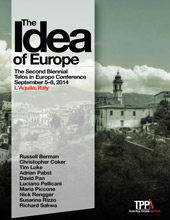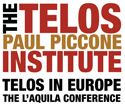By Richard Sakwa · Monday, September 15, 2014 The following paper was presented at the recent Telos in Europe conference on “The Idea of Europe,” held in L’Aquila, Italy, on September 5–8, 2014.
 The Ukraine crisis reflected the continuation in new forms of what used to be called the East-West conflict. After the end of the Cold War in 1989–91, as a result of Mikhail Gorbachev’s attempt to reform the Soviet Union based on the ideas of the “new political thinking,” no inclusive and equitable peace system was established. Instead, an asymmetrical peace was imposed on Russia. The Soviet Union disintegrated in December 1991, and Russia emerged as the “continuer state,” assuming the burdens, treaty obligations, and nuclear responsibilities of the former USSR. As far as Russia was concerned, the end of the Cold War had been a shared victory: everyone stood to gain from the end of the division of Europe, symbolized by the fall of the Berlin Wall in November 1989. The institutions of the Cold War in the East were dismantled, above all the Warsaw Treaty Organization (the Warsaw Pact), but on the other side the organizations of the Cold War were extended, above all in the form of the North Atlantic Treaty Organization (NATO). The Ukraine crisis reflected the continuation in new forms of what used to be called the East-West conflict. After the end of the Cold War in 1989–91, as a result of Mikhail Gorbachev’s attempt to reform the Soviet Union based on the ideas of the “new political thinking,” no inclusive and equitable peace system was established. Instead, an asymmetrical peace was imposed on Russia. The Soviet Union disintegrated in December 1991, and Russia emerged as the “continuer state,” assuming the burdens, treaty obligations, and nuclear responsibilities of the former USSR. As far as Russia was concerned, the end of the Cold War had been a shared victory: everyone stood to gain from the end of the division of Europe, symbolized by the fall of the Berlin Wall in November 1989. The institutions of the Cold War in the East were dismantled, above all the Warsaw Treaty Organization (the Warsaw Pact), but on the other side the organizations of the Cold War were extended, above all in the form of the North Atlantic Treaty Organization (NATO).
Continue reading →
By Adrian Pabst · Thursday, September 11, 2014 The following paper was presented at the recent Telos in Europe conference on “The Idea of Europe,” held in L’Aquila, Italy, on September 5–8, 2014.
 The continual crisis in Ukraine is perpetuating an East-West schism that was never overcome after the end of the Cold War. Even if there is no all-out war between the major powers involved in the Ukrainian conflict, Europe faces the distinct prospect of a permanent divide at its very heart. The EU increasingly looks like an annex to the United States, which oscillates between isolationism and interventionism. Meanwhile Russia is fast becoming a vassal state that supplies cheap resources to China. After more than 500 years at the center of international affairs, the whole of Europe is bereft of ideas and incapable of acting as a force for good. The continual crisis in Ukraine is perpetuating an East-West schism that was never overcome after the end of the Cold War. Even if there is no all-out war between the major powers involved in the Ukrainian conflict, Europe faces the distinct prospect of a permanent divide at its very heart. The EU increasingly looks like an annex to the United States, which oscillates between isolationism and interventionism. Meanwhile Russia is fast becoming a vassal state that supplies cheap resources to China. After more than 500 years at the center of international affairs, the whole of Europe is bereft of ideas and incapable of acting as a force for good.
Continue reading →
By Telos Press · Wednesday, May 28, 2014 Just a reminder that the deadline for abstract submissions for this year’s Telos in Europe conference has been extended until June 15. If you plan to submit your paper for the conference, please be sure to email your abstract (no more than 250 words) to laquila@telosinstitute.net by that date, and place “L’Aquila 2014 conference” in the email’s subject line. For complete details about the conference, as well as the full call for papers, visit the conference page on the Telos-Paul Piccone Institute website.
Continue reading →
By Telos Press · Wednesday, April 2, 2014 At this year’s Telos Conference in New York City, Telos Associate Editor Adrian Pabst outlined the theme of the upcoming Telos in Europe Conference, which will be held on September 5–8, in L’Aquila, Italy. This conference will focus on “The Idea of Europe,” and will offer speakers and attendees an opportunity to discuss Europe’s current crisis of identity. For complete details about the conference, as well as the full call for papers, please visit the conference page on the Telos Paul Piccone Institute website, located here.
Continue reading →
By Telos Press · Wednesday, December 4, 2013  The Telos-Paul Piccone Institute is pleased to announce its second biennial colloquium in L’Aquila, Italy. The theme of the conference will be “The Idea of Europe.” A full description of the conference, as well as the call for papers, is available on the Institute’s website. The Telos-Paul Piccone Institute is pleased to announce its second biennial colloquium in L’Aquila, Italy. The theme of the conference will be “The Idea of Europe.” A full description of the conference, as well as the call for papers, is available on the Institute’s website.
Continue reading →
|
|
 The Ukraine crisis reflected the continuation in new forms of what used to be called the East-West conflict. After the end of the Cold War in 1989–91, as a result of Mikhail Gorbachev’s attempt to reform the Soviet Union based on the ideas of the “new political thinking,” no inclusive and equitable peace system was established. Instead, an asymmetrical peace was imposed on Russia. The Soviet Union disintegrated in December 1991, and Russia emerged as the “continuer state,” assuming the burdens, treaty obligations, and nuclear responsibilities of the former USSR. As far as Russia was concerned, the end of the Cold War had been a shared victory: everyone stood to gain from the end of the division of Europe, symbolized by the fall of the Berlin Wall in November 1989. The institutions of the Cold War in the East were dismantled, above all the Warsaw Treaty Organization (the Warsaw Pact), but on the other side the organizations of the Cold War were extended, above all in the form of the North Atlantic Treaty Organization (NATO).
The Ukraine crisis reflected the continuation in new forms of what used to be called the East-West conflict. After the end of the Cold War in 1989–91, as a result of Mikhail Gorbachev’s attempt to reform the Soviet Union based on the ideas of the “new political thinking,” no inclusive and equitable peace system was established. Instead, an asymmetrical peace was imposed on Russia. The Soviet Union disintegrated in December 1991, and Russia emerged as the “continuer state,” assuming the burdens, treaty obligations, and nuclear responsibilities of the former USSR. As far as Russia was concerned, the end of the Cold War had been a shared victory: everyone stood to gain from the end of the division of Europe, symbolized by the fall of the Berlin Wall in November 1989. The institutions of the Cold War in the East were dismantled, above all the Warsaw Treaty Organization (the Warsaw Pact), but on the other side the organizations of the Cold War were extended, above all in the form of the North Atlantic Treaty Organization (NATO).  The Telos-Paul Piccone Institute is pleased to announce its second biennial colloquium in L’Aquila, Italy. The theme of the conference will be
The Telos-Paul Piccone Institute is pleased to announce its second biennial colloquium in L’Aquila, Italy. The theme of the conference will be 

